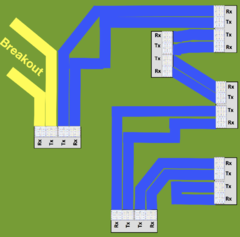Kandou Announces Availability of Glasswing USR SerDes IP
LAUSANNE, Switzerland -- May 28, 2018 -- Kandou Bus S.A., the global pioneer in multi-wire SerDes technology, today announced the introduction of the Glasswing™ USR SerDes, enabling the assembly of multiple chiplets inside a shared package without the need for costly silicon interposers. While advanced CMOS processes continue to provide a path for integration, there has been an increasing rise in costs associated with yield loss and with the design of large devices. Customers in networking, hyperscale datacenters, AI/machine learning and high-performance computing are now seeing the value of using the Glasswing USR SerDes to disaggregate large SoCs into smaller, more manageable pieces and pushing only necessary blocks into advanced processes.
“Glasswing is the rst Chord signaling-based SerDes that is optimized to support chiplet applications,” said Amin Shokrollahi, Founder and CEO of Kandou. “Our vision is an interoperable ecosystem of chiplet solutions enabled by Glasswing. The announcement today is the rst of many as we proliferate Glasswing to different foundries, metal stacks and process nodes while preserving the ability for all Glasswing IPs to communicate with each other.” The rst customer products that implement Glasswing are expected to ship later in 2018.

Glasswing and Chord™ Signaling
Glasswing is based on Kandou’s Chord™ signaling architecture which is a generalization of differential signaling. While differential signaling delivers one bit on two correlated wires, Chord signaling delivers n bits on n+1 correlated wires. The combination of the signaling on the wires and the comparators that are used to identify the bits are together called a “chordal chord”. Glasswing’s fundamental chordal code is CNRZ-5 which sends ve bits on six correlated wires:
Bits are introduced at different voltage levels on the wires using a carefully chosen codebook and the comparator network is uniquely designed to extract the bits and deliver NRZ-shaped binary eyes. The resulting binary eyes are much larger than the eyes realized with PAM-4, and the code is inherently more tolerant to Inter-Symbol Interference (ISI) and refections, a form of ISI that is especially important in USR applications. Larger eyes require less equalization, hence less power. Glasswing, for example, only uses a simple linear equalizer at the receiver. Glasswing delivers unprecedented SerDes performance with 500Gbps of bi-directional bandwidth on just 2.4mm of die edge while consuming only about 1 pJ/bit. The IP is designed to natively support a BER of at most 1E-15. Kandou offers a simple FEC as an additional feature that can improve margins and meet more stringent BER targets (1E-21 or better). The FEC is entirely optional but if used adds just 1.25ns of latency to the already low xed latency of the SerDes which is only 4.4ns.
Inside the package, Glasswing can support up to 6dB insertion loss which is more than 30mm with GZ-41 substrate material. More importantly, chiplets can be positioned in the corners of the MCM package, allowing better area optimization. In applications where the chiplets contain long-reach SerDes, the chiplet can be positioned very close to the package balls, greatly reducing package loss. The use of chiplets can also signi cantly increase the yield of the central die by moving functionality, such as the full I/O subsystem, into the chiplets.
Kandou has built three test chips to validate Glasswing in silicon.
Availability
The rst SerDes IP in the Glasswing family, called GW16-500-USR, is available immediately in a TSMC 16nm FinFet process. Multiple variants will soon be available for other processes and in different metal stacks and orientations. Work is also underway on development of solutions delivering twice and four times the current bandwidth per millimeter of die edge, both of which will be able to communicate with GW16- 500-USR. All IPs are full, turnkey solutions and are delivered with a comprehensive complement of design les, documentation, and eld support to insure ease of integration. Kandou also offers evaluation modules to allow customers to validate Glasswing’s in-system performance.
Flexible Business Model
In addition to a traditional hard IP license, Kandou also offers a soft IP license model that gives customers the flexibility to port the IP to different foundries, process nodes and metal stacks. The actual porting work may be performed by the customer, by Kandou, or by a Kandou partner.
Related Semiconductor IP
Related News
- Coherent Logix Selects Kandou's SerDes IP for its Low-Power, High-Performance C-Programmable Processors
- EXTOLL collaborates with ERIDAN as a Key Partner for Lowest Power High-Speed SerDes IP on GlobalFoundries’ 22FDX
- Credo Launches 224G PAM4 SerDes IP on TSMC N3 Process Technology
- Alphawave Semi Achieves 2025 TSMC OIP Partner of the Year Award for High-Speed SerDes IP
Latest News
- Marvell Completes Acquisition of XConn Technologies
- Rambus Announces Departure of Chief Financial Officer
- AI Elevates Production Management’s Importance in the ASIC Value Chain
- Cadence Unleashes ChipStack AI Super Agent, Pioneering a New Frontier in Chip Design and Verification
- Passing the Torch: Reflections on ARC’s Journey and the Future of Specialized Processing